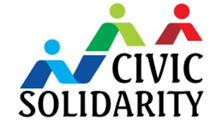Poland: Call for respect for constitutional guarantees
17:43, January 11, 2016 | Announcements, JointWe, members of the Civic Solidarity Platform express our deepest concern at recent developments affecting the state of democracy and human rights protection in Poland. These include, in particular, the ongoing constitutional crisis that poses a serious threat to the rule of law and the principle of separation of powers, as well as the new media legislation that jeopardizes the independence of public service broadcasting.
There have recently been several significant, problematic developments concerningthe Constitutional Tribunal in Poland. First, the president refused to swear into office the judges appointed to the Constitutional Tribunal by the previous parliament. In December 2015, the newly elected parliament appointed, at an alarming pace and without respect for the procedures set out by law, five new judges to the Constitutional Tribunal. The parliament did not wait for the tribunal’s ruling on whether the initially appointed judges had been appointed based on law in compliance with the Polish Constitution. The president immediately swore the five new judges into office. Furthermore, at the end of 2015, the parliament adopted the new Act on the Constitutional Tribunal, which may in fact block the work of this court. The newly adopted law threatens the independence of judges and may diminish the status and authority of the Constitutional Tribunal.
The Constitutional Tribunal is one of the most important elements of the system of human rights protection in Poland. The tribunal rules on whether laws adopted by the parliament are in compliance with the Constitution and considers complaints from citizens concerning violations of fundamental rights and freedoms protected by the Constitution. Weakening the status of the Constitutional Tribunal will decrease the effectiveness of the human rights protection system in Poland and undermine the rule of law.
We would also like to express our deepest concern at the recent amendments to the Act on Public Media, which were signed into law by the president on 7 January 2016. These amendments abolished open, transparent and competitive procedures for recruiting members of supervisory and management boards of public broadcasting companies, granted the executive branch the exclusive right to appoint and dismiss public media directors and dismissed – with immediate effect – the current board members of the Polish Public Service TV and Radio. Thus, the new legislation allows the government to influence the editorial and strategic positions of public broadcasting and gives it leverage to stifle critical voices at a time when it is essential that public broadcasters can speak out. Before being passed, the new media legislation was widely condemned by international human rights institutions, Polish and international civil society and the Polish independent broadcasting authority as being incompatible with a democratic State. Protests against the new legislation have been held across Poland.
Moreover, similarly to the Act on the Constitutional Tribunal, the newly adopted media legislation wasadopted in an accelerated procedure without any consultations being held with civil society. It entered into force without proper vacatio legis, which should have lasted at least 14 days.
In the last 26 years, Poland and the Polish society have come a long way from being a communist regime to a constitutional democracy with a vibrant civil society. This process has been an inspiration for many countries, which have also faced the challenge of political transformation. However, the recent reforms may lead to the squandering of key achievements in the area of democracy and human rights.
We strongly oppose these reforms and the procedures used to introduce them. We call on the Polish government to respect the principles of a democratic state and the human rights guarantees enshrined in the Constitution of the Republic of Poland, as well as its international human rights obligations and commitments. We also call on the government to listen to the voice of civil society and to work closely together with civil society to further strengthen rather than weakening democracy and human rights protection in the country. We recall that key features of democracy include governance through rule of law, independence of the judiciary, as well as freedom of expression and open debate on issues of public concern. Those in power must tolerate scrutiny and criticism of their actions and be prepared to be held accountable for their policies.
Finally, we note that representatives of international institutions have voiced concern about the recent worrying developments in Poland and that the European Commission will be holding a debate about them in Brussels on 13 January. We welcome the international attention to these issues and urge the European Commission, as well as other EU and international institutions to use their powers and influence to help ensure respect for constitutional guarantees, the rule of law and fundamental democratic and human rights principles in Poland.
Signed by the following members of the Civic Solidarity Platform:
Helsinki Foundation for Human Rights (Poland)
International Partnership for Human Rights (Belgium)
Human Rights Movement “Bir Duino-Kyrgyzstan”
Helsinki Citizens Assembly Vanadzor (Armenia)
Moscow Helsinki Group
Georgian Young Lawyers’ Association
Belarusian Helsinki Committee
Center for Civil Liberties (Ukraine)
Institute “Respublica” (Ukraine)
Kazakhstan International Bureau for Human Rights and Rule of Law
Promo LEX Association Moldova
Association of Ukrainian Human Rights Monitors on Law Enforcement
“Protection of Rights without Borders” (Armenia)
Norwegian Helsinki Committee
Center for the Development of Democracy and Human Rights (Russia)
Public Verdict Foundation (Russia)
Article 19 (United Kingdom)
Human Rights House Foundation
Kosova Rehabilitation Centre for Torture Victims
Belarusian Association of Journalists
Kharkiv Regional Foundation – Public Alternative (Ukraine)
Office of Civil Freedoms (Tajikistan)
Public Foundation “Golos Svobody” (Kyrgyzstan)
Bulgarian Helsinki Committee
Nota Bene (Tajikistan)
Helsinki Committee of Armenia
Barys Zvozskau Belarusian Human Rights House (Lithuania)
Humanrights.ch (Switzerland)
Swiss Helsinki Committee
Netherlands Helsinki Committee

